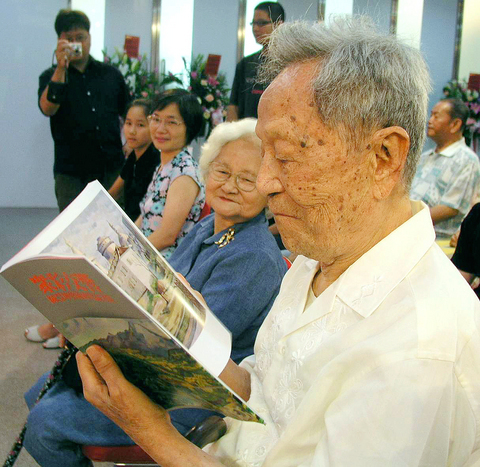To commemorate artist Chen Hui-kun's (
The book-launching ceremony was held by Egret Cultural & Educational Foundation (白鷺鷥文教基金會) and the Art & Collection Group (典藏藝術家庭) at the National Cultural Association (NCA) yesterday.
Chen, the father of NCA Secretary-General Tchen Yu-chiou (陳郁秀), was born on June 25th, 1907 in Taichung and had a difficult childhood after his parents' death.

PHOTO: LING MEI-HSUEH, TAIPEI TIMES
In primary school, his mentor learned that he was keenly interested in clay sculpture, and told him a story about Huang Tu-shui (黃土水), the first Taiwanese sculptor to study abroad in Japan. This inspired him to study in Japan.
The idea to study abroad was further strengthened during his high school days at National Taichung First Senior High School, when he happened to find three art magazines from France and a brochure from Tokyo Art School (renamed Tokyo National University of Fine Arts and Music in 1949).
In 1927, he made his dream come true by learning to sketch in Japan.
In 1948, he began his life as a professor at National Taiwan Normal University. In 1960, Chen went to Paris to continue his education although he was already 54 years old at the time. Though he is blind in one eye and is hard of hearing, he kept painting until recently.
Chen's work successfully combines the characteristics of Western, Chinese and Japanese art. His style reflects and interacts with the diversified characteristics of Taiwanese art.
"I always see my father's passion and persistence in art," Chen Yu-shiu (
She also thanked those professors and artists who contributed essays on her father's work for the new released book and enabled her to know her father's accomplishments better.
"The intricacies of oil paintings, Chinese ink paintings, poems and calligraphy were absorbed and mastered amazingly by Chen. He is really a grand artist in Taiwan's interwoven history of immigration and colonization," said Ni Tsai-chin (

Taiwan is stepping up plans to create self-sufficient supply chains for combat drones and increase foreign orders from the US to counter China’s numerical superiority, a defense official said on Saturday. Commenting on condition of anonymity, the official said the nation’s armed forces are in agreement with US Admiral Samuel Paparo’s assessment that Taiwan’s military must be prepared to turn the nation’s waters into a “hellscape” for the Chinese People’s Liberation Army (PLA). Paparo, the commander of the US Indo-Pacific Command, reiterated the concept during a Congressional hearing in Washington on Wednesday. He first coined the term in a security conference last

Prosecutors today declined to say who was questioned regarding alleged forgery on petitions to recall Democratic Progressive Party (DPP) legislators, after Chinese-language media earlier reported that members of the Chinese Nationalist Party (KMT) Youth League were brought in for questioning. The Ministry of Justice Investigation Bureau confirmed that two people had been questioned, but did not disclose any further information about the ongoing investigation. KMT Youth League members Lee Hsiao-liang (李孝亮) and Liu Szu-yin (劉思吟) — who are leading the effort to recall DPP caucus chief executive Rosalia Wu (吳思瑤) and Legislator Wu Pei-yi (吳沛憶) — both posted on Facebook saying: “I

A court has approved Kaohsiung prosecutors’ request that two people working for Democratic Progressive Party (DPP) Legislator Lin Dai-hua (林岱樺) be detained, as a probe into two cases allegedly involving her continues. The request was made on Friday, after prosecutors raided Lin’s two offices and the staffers’ residences, and questioned five on suspicion of contravening the Anti-Corruption Act (貪汙治罪條例). The people included the directors of Lin’s Daliao (大寮) and Linyuan (林園) district offices in Kaohsiung, surnamed Chou (周) and Lin (林) respectively, as well as three other staffers. The prosecutors’ move came after they interrogated Lin Dai-hua on Wednesday. She appeared solemn following

Sung Chien-liang (宋建樑), who led efforts to recall Democratic Progressive Party (DPP) Legislator Lee Kun-cheng (李坤城), was released on bail of NT$80,000 today amid outcry over his decision to wear a Nazi armband to questioning the night before. Sung arrived at the New Taipei District Prosecutors’ Office for questioning in a recall petition forgery case last night wearing a red armband bearing a swastika, carrying a copy of Adolf Hitler’s Mein Kampf and giving a Nazi salute. Sung left the building at 1:15am without the armband and covering the book with his coat. Lee said today that this is a serious